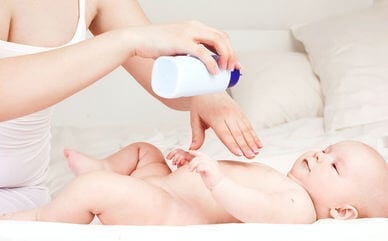Only the hardest of heart doesn’t like the fresh, innocent smell most commonly associated with babies: baby powder. However, baby powder detractors may be on to something. Even the American Pediatric Association (APA) recommends against using baby powder. Originally, the APA was concerned with talc, the natural mineral ingredient of traditional baby powder.
Only the hardest of heart doesn’t like the fresh, innocent smell most commonly associated with babies: baby powder. However, baby powder detractors may be on to something. Even the American Pediatric Association (APA) recommends against using baby powder. Originally, the APA was concerned with talc, the natural mineral ingredient of traditional baby powder.
As we’ve seen in recent lawsuits involving baby powder and ovarian cancer, talc is a major health concern these days. The main concern the APA had with talc was the possible inhalation risk and potential harm to babies’ lungs. In part, this is due to talc’s small, easily inhaled particles.
Jennifer Lowry, a pediatrician and the chair of the American Academy of Pediatrics’ Council on Environmental Health Executive Committee and a member of the Children’s Health Protection Advisory Committee for the Environmental Protection Agency, agrees. In a blog post for BabyCenter.com, Dr. Lowry wrote, “I recommend against it [baby powder] because of the risk of respiratory problems. The American Academy of Pediatrics points out that baby powder can cause breathing trouble and serious lung damage for babies if they inhale the particles. (And it’s hard to keep powder out of the air when you’re using it.)”
Dr. Lowry is especially concerned for babies with a high risk for respiratory issues. “Even small amounts of powder can irritate a baby’s tiny lungs – especially if the baby is at high risk for respiratory illness. Those at high risk include premature babies, babies with congenital heart disease, and babies who’ve had RSV [Respiratory Syncytial Virus] or frequent respiratory illnesses.”
What about cornstarch-containing alternatives to traditional baby powder? Are they safe for baby?

Dr. David Soma, a Mayo Clinic Children’s Hospital pediatrician, said “The talc powder is more concerning than cornstarch based powder, but the big take home message is that we don’t recommend powders.” He explained that any inhalable powder could pose health concerns, especially for the at-risk babies Dr. Lowry mentioned.
However, some parents may find it hard to give up baby powder as a diaper rash preventative. Both Drs. Lowry and Soma say that proper application is the most critical factor for those who decide to use the cornstarch-based alternative.
According to Dr. Lowry, “If your baby isn’t at high risk and you decide to use powder, do so sparingly. Put the powder on your hands first, away from your baby, not directly on or near her. To prevent skin irritation, don’t allow powder to build up. At every diaper change, wash away any powder that may have accumulated, especially in the folds of your baby’s skin.”
She also advised parents to “Keep the powder container well out of reach of your baby and of any older brothers and sisters, too. You don’t want small hands to get hold of it or knock it over and produce a cloud of powder that could be inhaled.”
Dr. Soma agreed, adding “If you elect to use it, try to keep it well localized to the diaper and away from any area that can be inhaled,” Soma said. “Use as little as possible, probably put it on your hands and transfer to the diaper area or gently sprinkle to the diaper area.”
What should parents do if they want to do away with baby powder altogether? An email statement from Dr. Michael Grosso, the chair of the Pediatrics Department at Northwell Health’s Huntington Hospital in New York answered that question.
“Whenever practical, having a baby’s bottom bare is the best remedy. Of course that isn’t practical a lot of the time. Many pediatricians, myself included, recommend a petroleum jelly based product, whether plain Vaseline or A+D Ointment.”
Dr. Lowry also provided a link to BabyCenter’s tips for diaper rash prevention and treatment. For those who may be looking for a natural diaper rash cream, please read this review of some of the top brands.
It seems those who don’t like the smell of baby powder are on to something after all.


Join the conversation!